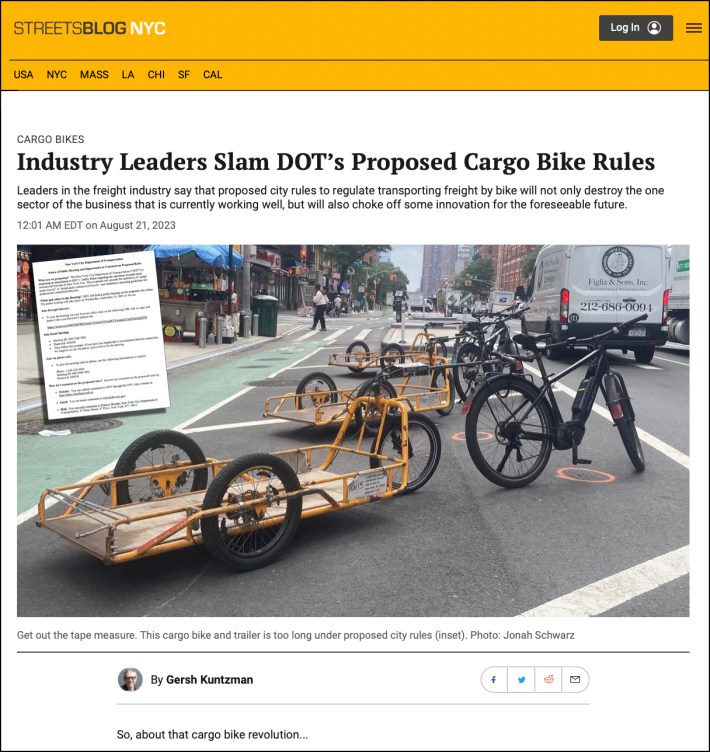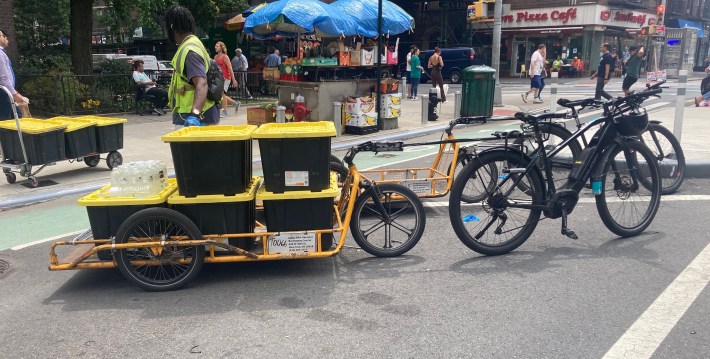Ever since Streetsblog broke the news that the Department of Transportation wants to create new rules for certain types of cargo bikes, the freight industry has been vociferous in its contention that the proposal needs to be tweaked. One industry leader even penned an open letter to DOT Commissioner Ydanis Rodriguez that we posted. Then, the commish fired back at his critics with his own Streetsblog op-ed. So on the eve of Wednesday's only hearing on the rule change, we now present yet another op-ed from yet another industry leader, Ben Morris of Coaster Cycles. Streetsblog: the only place where New Yorkers can stay informed about the crucial debate.
All eyes are on you, NYC DOT.
This Wednesday, the agency and its freight industry partners will discuss proposed — and surprisingly controversial — new rules around the convoluted cargo e-bike debate in New York City. As the founder of a company that builds exclusively in the B2B space for some of the largest logistics companies in the world, I want to review some of the pertinent issues ahead of the hearing.

First, the good news: As I discussed in these pages two years ago, the proposed rules wisely allow for a wider legal wheelbase for cargo bikes, from the current 36 inches to 48 inches. Four-wheeled bicycles up to 48 inches would also be legal under the proposed regulations. The rule change would only apply to pedal-assist e-bikes, similar to what we make at Coaster Cycles. This is a win: Wider bicycle form factors allow for increased safety, visibility, and ultimately less congestion and pollution in city streets along with greater capacity enabling more packages per route.
But the city’s proposal also contained some bad news: the proposed rule would cap the overall length of cargo bikes and trailers at 120 inches, or 10 feet. This one step forward is actually three steps back, as most of the existing cargo solutions utilizing a towable trailer currently exceed this length. This rule change would undo the last few years of freight delivery progress, and force packages currently being delivered by e-bike and trailer combos back into vans that contribute to increased congestion and pollution. There is absolutely no rational reason why this restrictive measure was put in place. If instituted, this will single handedly dismantle all the progress that has been made the past several years in New York City.
Also surprisng: The proposed ban on advertising on the sides of cargo bikes. Rodriguez in his recent op-ed for Streetsblog pointed out that the ban “has always been the case,” but such rigid rules block innovation. Advertising on taxi tops, double-decker buses, and Uber/Lyft is permitted, so why not e-trikes making deliveries? New York is synonymous with urban bustle clad in advertising — hello, Times Square — and this rule feels like another way to suppress progress via a revenue stream that helps offset hardware and operating costs for delivery companies.

Like many New Yorkers who are commenting on the proposed rules, I agree that larger cargo bikes shouldn’t co-mingle with bikes in the current bike lanes. But since every cargo bike takes a truck or a van off the road, it’s important for the city to make space for this more efficient, greener form of freight transport. DOT Commissioner Ydanis Rodriguez has talked about a few bike lanes that the city has widened, but this kind of effort must be dramatically expanded. European cities such as London have already done so, allowing the freight industry to innovate and expand across the region.
Cities across the country, large and small, are looking up to you, DOT. Embrace cargo bike logistics, support the riders who operate these bikes, and the public that interacts with them. Onerous rules and regulations don't have future generations in mind. New York can set the precedent for freight delivery for the rest of the country as long as leaders are growth-minded and don’t get bogged down in rules.






